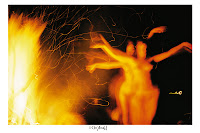Wordsmiths: The Fortress of Solitude
Today's wordsmith is slightly unusual in that he is the first prose writer that I've featured. Jonathan Lethem is a Brooklyn writer and prolific essayist. His novels tend to defy categories, with "magical realism" perhaps coming closest, and they usually deal with off-the-beat characters, settings and situations. He is keen to explore subjectivity and the interior life. His 1999 novel Motherless Brooklyn won a slew of awards.
I'm going to confess that the book from which this excerpt is taken, The Fortress of Solitude, belongs to my started-but-never-finished pile. The novel centers on a coming-of-age tale of two friends, through the lens of racial tensions and pop music in 1970s Brooklyn. Oh, and the main character can fly. Really. (As you can see, Lethem doesn't see fit to meet our preconceptions!) Lethem is a novelist who writes like a poet. His first page, reprinted below, riveted me from the word go, as he paints a canvas of a Brooklyn street one humid summer evening to provide the reader a glimpse of a society on the cusp of change. Old and new, side by side.
 Like a match struck in a darkened room:
Like a match struck in a darkened room:
Two white girls in flannel nightgowns and red vinyl roller skates with white laces, tracing tentative circles on a cracked blue slate sidewalk at seven o'clock on an evening in July.
The girls murmured rhymes, were murmured rhymes, their gauzy, sky-pink hair streaming like it had once never been cut. The girls' parents had permitted them back onto the street after dinner, only first changing into the gowns and brushing their teeth before bed, to bask in the orange-pink summer dusk, the air and light which hung over the street, over all of Gowanus like the palm of a hand or the inner surface of a seashell. The Puerto Rican men seated on milk crates in front of the bodega on the corner granted at the apparition, not sure of what they were seeing. They widened their lips to show one another their teeth, a display to mark patience, wordless enduring. The street strewn with bottle caps half-pushed into the softened tar, Yoo-Hoo, Rheingold, Manhattan Special.
The girls, Thea and Ana Solver, shone like new-struck flames.
An old white woman had arrived on the block before the Solvers, to reclaim one of the abused buildings, one which had been a rooming house, replacing fifteen men with only herself and her crated belongings. She was actually the first. But Isabel Vendle only lurked like a rumor, like an apostrophe inside her brownstone, where at this moment she crept with a cane...Isabel Vendle was a knuckle, her body curled around the gristle of old injuries...
The girls on wheels were the new thing, spoilt to start the show: white people were returning to Dean Street. A few.
If you're tempted, be forewarned, Lethem is no easy read! I didn't have the patience to get through it, and admittedly 1970s New York is a bit remote to me. (Oh, and leave a comment if you can guess what the title is a reference to. It's not difficult!)
I'm going to confess that the book from which this excerpt is taken, The Fortress of Solitude, belongs to my started-but-never-finished pile. The novel centers on a coming-of-age tale of two friends, through the lens of racial tensions and pop music in 1970s Brooklyn. Oh, and the main character can fly. Really. (As you can see, Lethem doesn't see fit to meet our preconceptions!) Lethem is a novelist who writes like a poet. His first page, reprinted below, riveted me from the word go, as he paints a canvas of a Brooklyn street one humid summer evening to provide the reader a glimpse of a society on the cusp of change. Old and new, side by side.
 Like a match struck in a darkened room:
Like a match struck in a darkened room:Two white girls in flannel nightgowns and red vinyl roller skates with white laces, tracing tentative circles on a cracked blue slate sidewalk at seven o'clock on an evening in July.
The girls murmured rhymes, were murmured rhymes, their gauzy, sky-pink hair streaming like it had once never been cut. The girls' parents had permitted them back onto the street after dinner, only first changing into the gowns and brushing their teeth before bed, to bask in the orange-pink summer dusk, the air and light which hung over the street, over all of Gowanus like the palm of a hand or the inner surface of a seashell. The Puerto Rican men seated on milk crates in front of the bodega on the corner granted at the apparition, not sure of what they were seeing. They widened their lips to show one another their teeth, a display to mark patience, wordless enduring. The street strewn with bottle caps half-pushed into the softened tar, Yoo-Hoo, Rheingold, Manhattan Special.
The girls, Thea and Ana Solver, shone like new-struck flames.
An old white woman had arrived on the block before the Solvers, to reclaim one of the abused buildings, one which had been a rooming house, replacing fifteen men with only herself and her crated belongings. She was actually the first. But Isabel Vendle only lurked like a rumor, like an apostrophe inside her brownstone, where at this moment she crept with a cane...Isabel Vendle was a knuckle, her body curled around the gristle of old injuries...
The girls on wheels were the new thing, spoilt to start the show: white people were returning to Dean Street. A few.
If you're tempted, be forewarned, Lethem is no easy read! I didn't have the patience to get through it, and admittedly 1970s New York is a bit remote to me. (Oh, and leave a comment if you can guess what the title is a reference to. It's not difficult!)
Labels: books, imagination, wordsmiths












Post a Comment
<< Home